2019译林版高中英语选择性必修一Unit 4 Exploring poetry 单词表
译林版高二英语选择性必修一 Unit 4 Exploring poetry L1教案
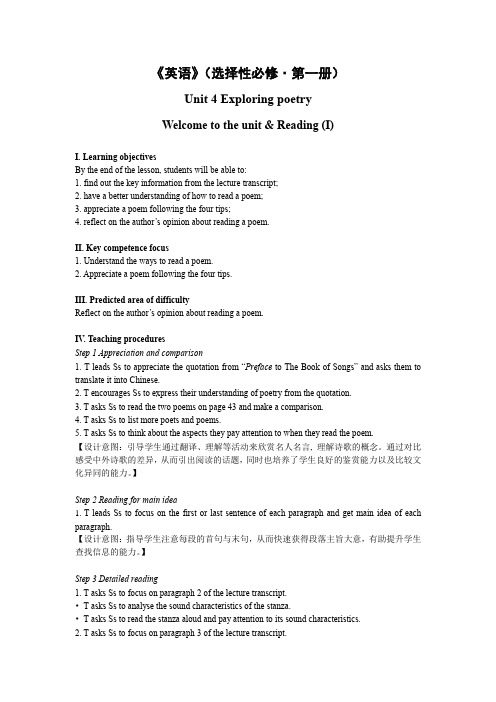
《英语》(选择性必修·第一册)Unit 4 Exploring poetryWelcome to the unit & Reading (I)I. Learning objectivesBy the end of the lesson, students will be able to:1. find out the key information from the lecture transcript;2. have a better understanding of how to read a poem;3. appreciate a poem following the four tips;4. reflect on the author’s opinion about reading a poem.II. Key competence focus1. Understand the ways to read a poem.2. Appreciate a poem following the four tips.III. Predicted area of difficultyReflect on the author’s opinion about reading a poem.IV. Teaching proceduresStep 1 Appreciation and comparison1. T leads Ss to appreciate the quotation from “Preface to The Book of Songs” and asks them to translate it into Chinese.2. T encourages Ss to express their understanding of poetry from the quotation.3. T asks Ss to read the two poems on page 43 and make a comparison.4. T asks Ss to list more poets and poems.5. T asks Ss to think about the aspects they pay attention to when they read the poem.【设计意图:引导学生通过翻译、理解等活动来欣赏名人名言, 理解诗歌的概念。
新教材牛津译林版选择性必修第一册Unit4 Exploring poetry教学课件
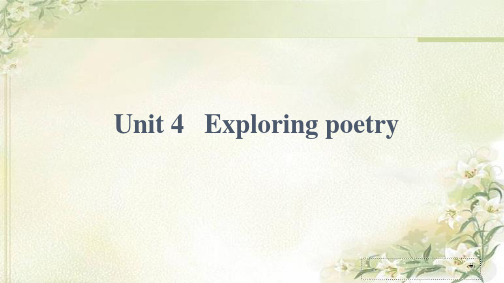
4.His theories are somewhat _re_m__o_te_ from reality. 5.There is another _d_i_m_e_n_s_io_n_ to this problem which you haven't considered. 6.The tests are designed to _d_e_t_e_ct_ the disease early. 7.The last two lines of this poem don't _rh_y_m__e_ properly. 8.It's a _c_o_m_p_l_e_x_ issue,but he only sees it in black and white. 9.The advice I received was often _c_o_n_t_r_ad_i_c_t_o_ry__. 10.Wade stepped inside and closed the _in_n_e_r_ door behind him.
Unit 4 Exploring poetry
1.The finest poetry was first experience. 最优美的诗来自切身感受。
—Emerson ——爱默生
2.Poetry which has been defined as the harmonious union of man
[探索发现] 1.Find out what field is Li Bai famous for? _C_l_a_ss_i_c_a_l _p_o_e_m_._ 2.Find out who is He Zhizhang? _H_e__is_a_n_o_t_h_e_r_l_ea_d_e_r_o_f__li_te_r_a_tu_r_e_i_n_T__an_g__D_y_n_a_s_t_y_a_n_d__co_u_l_d__b_e_L_i__ _B_a_i_'s_t_e_ac_h_e_r_. 3.Find out why Li Bai was regarded to be The Immortal of
新牛津译林版高中英语选修一Unit4Exploring poetry-ExtendedReading
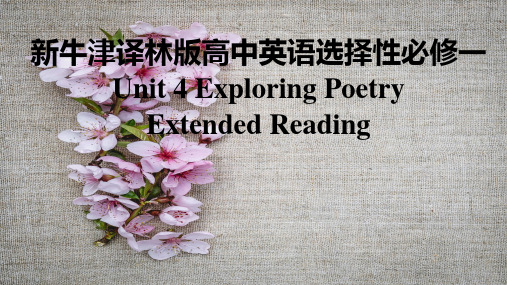
Fast reading
Features
para.5
social and historic context
A Night Stay at a Mountain TempleA hundred feet the temple towers;I can reach out for the stars in the sky.But I dare not speak in a voice loud,For fear of scaring dwellers on high.
Para.6: The significance of Li Bai and his poems
A hundred feet the temple towers;I can reach out for the stars in the sky.But I dare not speak in a voice loud,For fear of scaring dwellers on high. (“A Night Stay at a Mountain Temple”)
李白的浪漫主义风格与其自幼喜读书、好游历不无关联。他五岁就诵读经典,十岁读儒道等诸子百家的著作。他博览群书,从传奇故事到历史典故无所不窥,从而对古代经典文化谙熟于心,更重要的是,他从中汲取了先贤们的智慧。
para 2
是...的原因之一
更重要的是
使自己熟悉某事
Driven by a burning desire for adventure and travel, Li Bai left home and started to travel around in his early twenties. His footsteps covered almost the whole country. During his travels, he visited famous mountains and great rivers, encountering different customs and practices. These travelling experiences also nourished his love of nature and inspired him to write numerous poems in the romantic style.
译林版英语选择性第一册课件Unit4Exploringpoetry单元重点回顾

be cast down (by sth) (因某事)沮丧,不愉快
cast a shadow over sth给某事蒙上阴影;投下影子
cast an eye on/over sth迅速检查/浏览某物
cast light on sth使了解某事
27.owe vt.欠(情);欠(债)
owe sth to
重点句式
1.Poems that are easy to understand are often less interesting than those that constantly reveal deeper and previously unrecognized meanings. 2.Equally impressive is Li Bai’s free expression of strong feelings, which breathes vitality into the lifeless objects he describes,and which distinguishes him from other landscape poets.
break in强行闯入,侵入;插话
break off折断;中断;停止说话;(工作中)稍作休息
break through 突破……
break out 突然爆发
16.undergo vt.经历,经受 17.advocate vt.拥护,支持,提倡 n.拥护者,支持者;辩护律师 advocate (doing) sth提倡/主张(做)某事 advocate that...(should) do...主张/提倡……应该做……
with patience=patiently 耐心地 11.aside adv.到旁边,在旁边;留,存;除……以外 set sth aside把……放一边;留出 step/move aside靠边;站到一边 aside from 除……以外 put/leave/set aside留出;放到一边
Unit4Exploringpoetry写作专项训练(诗歌评论)课件高中英语译林版选择性
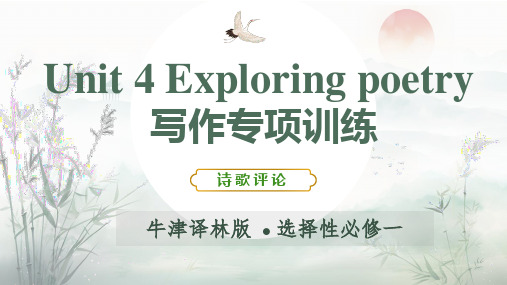
( vividly, love, her child) by comparing it to the warm and selfless sun. All the above is 5. w__h_at_I_k_n_o_w__a_b_o_u_t _th_e_w_i_d_e_ly_r_e_a_d_c_la_s_s_ic_ (know about, classic),
hard in the field on a very hot day with their sweat frequently falling into the soil. What’s more, the authowriths复ho合w结s构h作i状s c语are for the farmers
第一段: 介绍诗歌的基本信息。
第二段: 介绍诗歌所表达的内容
第三段: 写出诗歌的写作意图。
【范文赏读】
Here is a poem titled “The Peasants(II)” by Tang Dynasty poet 动词-ed形式短语作后置定语
Li Shen who is popular with Chinese readers. The poem paints a picture in which some"f介ar词m+关er系s代ar词e"引w导or的k定in语g从句
Dear Andy, 1.__K_n_o_w_i_n_g_t_ha_t_y_o_u_a_r_e_i_n_te_r_es_t_ed__in__C_h_in_e_s_e_p_o_et_r_y_ ( know, interested ), I'm
writing to offer you some information about the poem you asked about. Written by a famous poet in the Tang Dynasty, Meng Jiao, 2. ______________
牛津译林版选择性必修第一册Unit4 Exploring poetry单词短语句型写作知识点提炼汇总
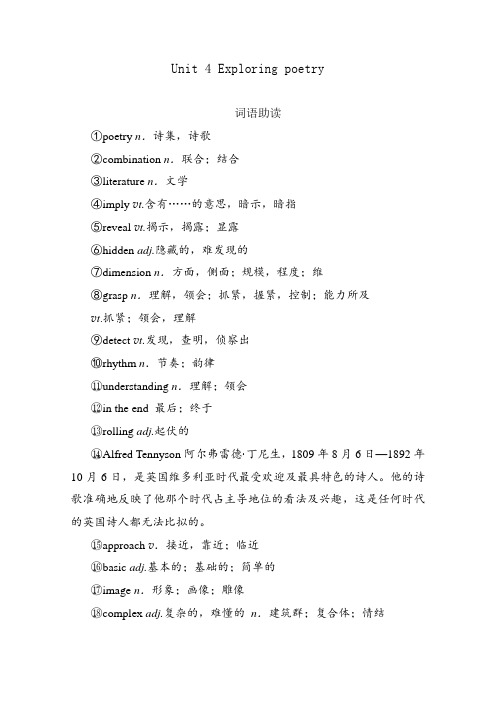
Unit 4 Exploring poetry词语助读①poetry n.诗集,诗歌②combination n.联合;结合③literature n.文学④imply v t.含有……的意思,暗示,暗指⑤reveal v t.揭示,揭露;显露⑥hidden adj.隐藏的,难发现的⑦dimension n.方面,侧面;规模,程度;维⑧grasp n.理解,领会;抓紧,握紧,控制;能力所及v t.抓紧;领会,理解⑨detect v t.发现,查明,侦察出⑩rhythm n.节奏;韵律⑪understanding n.理解;领会⑫in the end 最后;终于⑬rolling adj.起伏的⑭Alfred Tennyson阿尔弗雷德·丁尼生,1809年8月6日—1892年10月6日,是英国维多利亚时代最受欢迎及最具特色的诗人。
他的诗歌准确地反映了他那个时代占主导地位的看法及兴趣,这是任何时代的英国诗人都无法比拟的。
⑮approach v.接近,靠近;临近⑯basic adj.基本的;基础的;简单的⑰image n.形象;画像;雕像⑱complex adj.复杂的,难懂的n.建筑群;复合体;情结⑲contradictory adj.相互矛盾的,对立的⑳surroundings n.周围的环境surrounding adj.周围的,四周的surround v t.包围;围绕;环绕21dig up 发现,搜集,查明○22clue n.线索,提示;迹象○23fearful adj.吓人的;可怕的○24trill n.(鸟的)啼啭;颤音○v t.欢快地高声说v i.发颤音25Maya Angelou玛雅·安吉洛,1928年4月4日出生于美国密苏里○州圣·路易斯市。
美国黑人作家、诗人、剧作家、编辑、演员、导演和教师。
26interpret v t.解释,阐释;把……理解为,领会;演绎○v i.口译27painstaking adj.艰苦的;辛苦的○28patience n.耐心,忍耐力○29set sth.aside把……放一边;留出○30remote adj.偏远的,偏僻的;遥远的,久远的;远亲的○31destination n.目的地○32discovery n.发现,发觉;被发现的人或物○33reward v t.奖励,奖赏n.奖励,回报;悬赏金○34constantly ad v.连续地;不断地○35previously ad v.先前;以前;(一段时间)以前○36constantly ad v.始终,一直○37previously ad v.先前;(一段时间)以前○38logical adj.符合逻辑的;必然的,合乎情理的○39inner adj.内心的,隐藏的;里面的,内部的○40as long as只要○41perceive v t.注意到,意识到;将……理解为,将……视为○42everlasting adj.永久的;永恒的○课本原文How to read a poemPoetry①is a combination②of “sound”and “sense”.More than any other type of literature③,it usually implies④a deeper meaning beyond the words on the page.So,how to reveal⑤this hidden⑥dimension⑦?First,follow your ears.While you may ask “What does it mean?”as you begin reading a poem【1】,it is better to ask “How does it sound?” Even if its true meaning appears to be beyond your grasp⑧,you can always say something about how the poem sounds when you read it aloud.Do you detect⑨ a rhythm⑩?Are there any repeated words,rhymes or other special effects? All of these are good qualities to notice,and they may lead you to a better understanding⑪of the poem in the end ⑫.Read these lines to feel how they sound.【1】while引导让步状语从句,表示“尽管”;as引导时间状语从句。
牛津译林版2019选修一Unit4 Exploring poetry单元检测AB卷(含解析)

(8)Unit 4 Exploring poetry—高二英语牛津译林版(2020)选择性必修第一册单元检测卷(B卷)一、语法填空(共10小题;每小题4分,满分40分)1.When we got a call _____(say) she was short-listed, we thought it was a joke.2.They represent the earth _____ (come) back to life and best wishes for new beginnings.3._____(learn) to think critically is an important skill today's children will need for the future.4.The first time I saw Jenny, she _____(talk) to some students at the English Corner.5.______ (compare) with Susan, I have a long way to go.6.Luckily, my parents were tolerant _______ my choice of career.7.______(cover) an area about three times the size of Yellowstone National Park, the GPNP will be one of the first national parks in the country.8.Inspired by the Belt and Road Forum for International Cooperation ______(hold) in Beijing, Cao decided to cover the route by hiking as a tribute(致敬) to the ancient Silk Road.9.But Cobb and others are now questioning that idea—pushing conferences to provide more chances to participate remotely and _____(change) their personal behavior to do their part in dealingwith the climate change crisis.10.And when he saw the mists rising from the river and the soft clouds _____(surround) the mountain tops, he was reduced to tears.二、阅读理解(共4小题;每小题5分,满分20分)In 1916, two girls of wealthy families, best friends from Auburn, N.Y.—Dorothy Woodruff and Rosamond Underwood—traveled to a settlement in the Rocky Mountains to teach in a one-room schoolhouse. The girls had gone to Smith College. They wore expensive clothes. So for them to move to Elkhead, Colo. to instruct the children whose shoes were held together with string was a surprise. Their stay in Elkhead is the subject of Nothing Daunted: The Unexpected Education of Two Society Girls in the West by Dorothy Wickenden, who is a magazine editor and Dorothy Woodruff's granddaughter.Why did they go then Well, they wanted to do something useful. Soon, however, they realized what they had undertaken.They moved in with a local family, the Harrisons, and, like them, had little privacy, rare baths, and a blanket of snow on their quilt when they woke up in the morning. Some mornings, Rosamond and Dorothy would arrive at the schoolhouse to find the children weeping from the cold. In spring, the snow was replaced by mud over ice.In Wickenden's book, she expanded on the history of the West and also on feminism, which of course influenced the girls' decision to go to Elkhead. A hair-raising section concerns the building of the railroads, which entailed(牵涉) drilling through the Rockies, often in blinding snowstorms. The book ends with Rosamond and Dorothy's return to Auburn.Wickenden is a very good storyteller. The sweep of the land and the stoicism(坚忍) of the people move her to some beautiful writing. Here is a picture of Dorothy Woodruff, on her horse, looking down from a hill top: "When the sun slipped behind the mountains, it shed a rosy glow all around them. Then a full moon rose. The snow was marked only by small animals: foxes, coyotes, mice, and varying hares, which turned white in the winter."11.Why did Dorothy and Rosamond go to the Rocky MountainsA. To teach in a school.B. To study American history.C. To write a book.D. To do sightseeing.12.What can we learn about the girls from paragraph 3A. They enjoyed much respect.B. They had a room with a bathtub.C. They lived with the local kids.D. They suffered severe hardships.13.Which part of Wickenden's writing is hair-raisingA. The extreme climate of Auburn.B. The living conditions in Elkhead.C. The railroad building in the Rockies.D. The natural beauty of the West.14.What is the textA. A news report.B. A book review.C. A children's story.D. A diary entry.三、七选五(共5小题;每小题4分,满分20分)How to Choose Extracurricular ActivitiesFrom sports to clubs to outside organizations, there are many activities to take part in outside the classroom. ①_______ Fortunately, it becomes quite easy once you figure out what you enjoy doing in general. With a little more careful thought, you can also choose an activity that interests you.Think about your interests and know your advantages. Before you start considering specific(具体的) activities, take a step back. Think about what excites you and find your passions(热情). ②________ Now that you have a better idea of what you like to do in general, decide on those that you are good at. Ask yourself what skills they show. Then find activities that require the same ones. Make sure that you will enjoy yourself by choosing an activity that lets you shine.③________ In addition to your interests and advantages, know what you would like to improve about yourself. Use activities as a way tomake yourself better. Find out new challenges, without the added stress of having to earn good grades at them. You can use activities to develop general skills that you may not have.Find out what activities are available(可用的) and look into each one. ④_______ If the website seems incomplete, talk with your teacher or parents. Also look for calendar details, such asstart-and-end dates, plus event schedules, to make sure it won't get in the way of anything else going on in your life. Once you have a list of activities that match your interests, do a little research.⑤________A. Think about skills you want to develop.B. This can make choosing one a little difficult.C. Use your freshman year to explore your choices.D. In this way, you will have a better idea of what to expect.E. Also make sure that their culture is a good match for your own personality.F. Use those to decide on activities that will keep you interested for a long time.G. Search your school's website for a complete list of all the activities it provides.t四、书面表达(共1题;满分20分)假定你是红星高中学生会主席李华,你校交换生David 上周五面向全体师生作了题为"学英语,讲中国故事"的演讲,反响十分热烈,请你用英语给他写一封邮件表示祝贺和感谢,内容包括:1. 祝贺演讲成功;2. 你的感受。
译林版高中英语学案选择性必修第一册 Unit 4 Exploring poetry 单元素能巩固提升
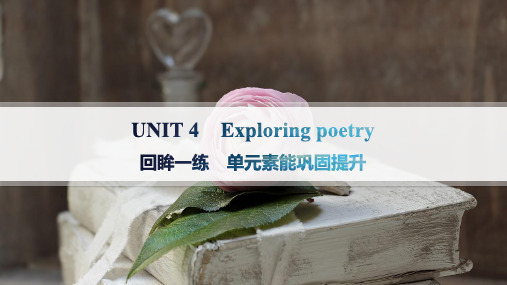
1. grasp n.理解,领会;抓紧,握紧,控制;能力所及 vt.抓紧;领会,理解 2. complex adj.复杂的,难懂的 n.建筑群;复合体;情结 3. contradictory adj.相互矛盾的,对立的 4. clue n.线索,提示;迹象 5. reward vt.奖励,奖赏 n.奖励,回报;悬赏金 6. rigid adj.死板的,僵硬的;固执的,僵化的 7. claim n.声明,宣称;所有权;索赔 vt.宣称,声称;要求;索取;获得
10. be faced with
面对
11. get across to sb
让某人听懂
12. from my point of view 依我之见
13. as for
关于,至于
14. familiarize...with
使熟悉;精通
15. more importantly
更重要的是
16. be rooted in
3. patience n.耐心;忍耐力→ patient adj.忍耐的;耐心的 n.病人
→ patiently adv.耐心地
4. reality n.事实,实际经历;现实;实际情况
→ real adj.真的→ really adv.真正地;实际上
5. representative adj.典型的,有代表性的 n.典型人物,代表性人物;代表 → represent vt.代表;描绘 6. stability n.稳定(性),稳固(性) → stable adj.稳定的,牢固的;稳重的,沉稳的 → stabilize v.使稳定,稳固 7. tolerant adj.宽容的,容忍的;能耐……的 → tolerantly adv.宽容地,容忍地 → tolerance n.忍受;忍耐力
- 1、下载文档前请自行甄别文档内容的完整性,平台不提供额外的编辑、内容补充、找答案等附加服务。
- 2、"仅部分预览"的文档,不可在线预览部分如存在完整性等问题,可反馈申请退款(可完整预览的文档不适用该条件!)。
- 3、如文档侵犯您的权益,请联系客服反馈,我们会尽快为您处理(人工客服工作时间:9:00-18:30)。
/vaɪˈtæləti/
n.生命力,活力,热情(54)
distinguish
/dɪˈstɪŋɡwɪʃ/
vt. & vi.成为···的特征,使有别于;区分,辨别;认出;使出众(54)
exaggeration
/ɪɡˌzædʒəˈreɪʃn/
n.夸张,夸大* (54)
metaphor
/ˈmetəfə(r)/
n.方面,侧面;规模,程度;堆(44)
grasp
/ɡrɑːsp/
n.理解,领会;抓紧,握紧,控制;能力所及. vt.抓紧;领会,理解(44)
detect
/dɪˈtekt/
vt.发现,查明,侦察出(44)
rhyme
/raɪm/
n.押韵词;押韵. vt.使押韵. vi.和···同韵(44)
complex
dare
/deə(r)/
vi. & vt.敢于,胆敢;激(某人做某事)(53)
dweller
/ˈdwelə(r)/
n.居民,居住者* (53)
striking
/ˈstraɪkɪŋ/
adj.引人注目的,显著的;妩媚动人的,标致的(53)
characterize
/ˈkærəktəraɪz/
vt. (alsocharacterise)是···的特征,以···为典型;使···具有特点,描述,刻画(53)
/ˈkɒmpleks/
adj.复杂的,难懂的. n.建筑群;复合体;情结(45)
contradictory
/ˌkɒntrəˈdɪktəri/
adj.相互矛盾的,对立的(45)
dig up发现,搜集,查明(45)
clue
/kluː/
n.线索,提示;迹象(45)
cage
/keɪdʒ/
vt.把(动物)关在笼中. n.笼子(45)
/ˈlɒdʒɪkl/
adj.符合逻辑的;必然的,合乎情理的(45)
inner
/ˈɪnə(r)/
adj.内心的,隐藏的;里面的,内部的(45)
perceive
/pəˈsiːv/
vt.注意到,意识到;将···理解为,将···视为(45)
reality
/riˈæləti/
n.现实,实际情况;事实,实际经历(45)
claim
/kleɪm/
n.声明,宣称,所有权;索赔. vt.宣称,声称;要求;索取;获得(mp; vt. (trod, trodden)踩,踏;踩碎,践踏,行走,步行* (50)
sigh
/saɪ/
n. & vi.叹气,叹息* (50)
hence
/hens/
adv.因此,由此(50)
blame
/bleɪm/
vt.把···归咎于,责怪,指责. n.责任,责备,指责(55)
allowance
/əˈlaʊəns/
n.津贴,补助;限额;零花钱(55)
make allowance for体谅;考虑到,估计到(55)
triumph
/ˈtraɪʌmf/
n.巨大成功,重大成就,伟大胜利. vi.打败,战胜,成功* (55)
impostor
/ɪmˈpɒstə(r)/
n.冒名顶替者,冒名行骗者* (55)
unforgiving
/ˌʌnfəˈɡɪvɪŋ/
adj.棘手的;不饶人的,不宽容的(55)
说明:本表收录各单元阅读文章和语篇练习中所包含的生词和短语,不收录指示语和讲解文字中所包含的生词和短语。带*的词条为《普通高中英语课程标注(2017年版2020年修订)》规定之外的词汇。
trill
/trɪl/
n. (鸟的)啼啭,颤音. vt.欢快地高声说. vi.发颤音* (45)
interpret
/ɪnˈtɜːprət/
vt.解释,阐释;把···理解为,领会;演绎. vi.口译(45)
patience
/ˈpeɪʃns/
n.耐心,忍耐力(45)
aside
/əˈsaɪd/
adv.到旁边,在旁边,留,存;除···以外(45)
set sth aside把···放一边;留出(45)
remote
/rɪˈməʊt/
adj.偏远的,偏僻的;遥远的,久远的;远亲的(45)
reward
/rɪˈwɔːd/
vt.奖励,奖赏. n.奖励,回报;悬赏金(45)
constantly
/ˈkɒnstəntli/
adv.始终,一直(45)
logical
belief
/bɪˈliːf/
n.看法,信念;信仰;相信,信心(48)
era
/ˈɪərə/
n.时代,年代(48)
district
/ˈdɪstrɪkt/
n.区,行政区;地区,区域(49)
diverge
/daɪˈvɜːdʒ/
vi.分叉,岔开;分歧,相异;偏离*(50)
bend
/bend/
vi. & vt. (bent, bent)(使)拐弯,弯曲. n.拐弯,弯道(50)
mist
/mɪst/
n.薄雾,水汽(47)
novelist
/ˈnɒvəlɪst/
n.小说家(48)
break with sth与某事终止关联,破除(48)
ideal
/aɪˈdiːəl/
n.理想;典范. adj.完美的,理想的(48)
rigid
/ˈrɪdʒɪd/
adj.死板的,僵硬的;固执的,僵化的(48)
Unit 4 Exploring poetry
默写
barren
/ˈbærən/
adj.贫瘠的,不毛的;不结果实的*(43)
frozen
/ˈfrəʊzn/
adj.结冰的,冰封的;冷冻的;冻僵的(43)
imply
/ɪmˈplaɪ/
vt.含有···的意思,暗示;暗指(44)
dimension
/dɪˈmenʃn/
undergo
/ˌʌndəˈɡəʊ/
vt. (underwent,undergone)经历,经受(48)
industrialization
/ɪnˌdʌstrɪəlaɪˈzeɪʃən/
n.工业化(48)
advocate
/ˈædvəkeɪt/
vt.拥护,支持,提倡. n. /ˈædvəkət/拥护者,支持者;辩护律师(48)
owe
/əʊ/
vt.欠(情);欠(债)(54)
debt
/det/
n.人情债,情义,恩情;借款,欠款,债务(54)
fascinate
/ˈfæsɪneɪt/
vt. & vi.深深吸引,迷住* (54)
entitle
/ɪnˈtaɪtl/
vt. (usually passive)给···命名;使享有权利,使符合资格(54)
stability
/stəˈbɪləti/
n.稳定(性),稳固(性)(54)
tolerant
/ˈtɒlərənt/
adj.宽容的,容忍的;能耐···的(54)
liberty
/ˈlɪbəti/
n.自由(54)
unconstrained
/ˌʌnkənˈstreɪnd/
adj.不受约束的,自由的* (54)
Confucianism
/kənˈfju:ʃənizm/
n.儒家,儒学,孔子学说(53)
Taoism
/'tauizəm/
n./'dauizəm/道教,道家* (53)
legend
/ˈledʒənd/
n.传说,传奇故事,传奇人物* (53)
encounter
/ɪnˈkaʊntə(r)/
vt.偶然碰到,意外地遇见;遭遇,碰到. n.相遇,遭遇,冲突(53)
n.暗喻,隐喻* (54)
representative
/ˌreprɪˈzentətɪv/
adj.典型的,有代表性的. n.典型人物,代表性人物;代表(54)
frost
/frɒst/
n.霜;霜冻,严寒天气(54)
cast
/kɑːst/
vt. (cast, cast)投射;向···投以(视线、笑容等);投,抛;选派角色. n.全体演员;投,抛(54)
nourish
/ˈnʌrɪʃ/
vt.培养,助长;抚养,滋养* (53)
numerous
/ˈnjuːmərəs/
adj.众多的,许多的(53)
glorious
/ˈɡlɔːriəs/
adj.荣耀的,光荣的;壮丽的,辉煌的* (53)
boom
/buːm/
n. (贸易和经济活动的)激增,繁荣. vi.迅速发展,激增,繁荣昌盛* (54)
